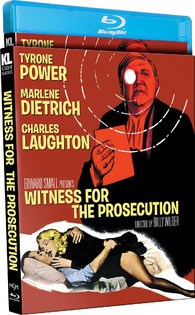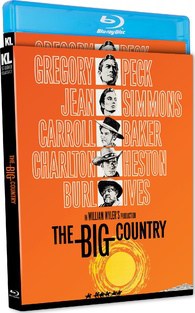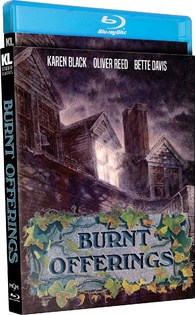[ad_1]
 Witness for the Prosecution [KL Studio Classics]
Witness for the Prosecution [KL Studio Classics]
What is it? A celebrated barrister takes on the defense of a man accused of murder.
Why see it? Billy Wilder is a filmmaker best known for numerous films as everyone has their own favorite. Sunset Boulevard, The Apartment, Some Like It Hot, Double Indemnity, Sabrina, Ace in the Hole, The Seven Year Itch, The Lost Week-End, Stalag 17… like I said, everyone will have their own favorite. Just as good, if not better, than most of those is 1952’s brilliantly witty courtroom thriller, Witness for the Prosecution. The great Charles Laughton plays the barrister who takes the case reluctantly given his poor health, and the script — co-written by Wilder and based on an Agatha Christie play — moves like a wildly entertaining wildfire. Nearly two hours, the film never drags and instead flies by as the case and characters are introduced leading quickly into the trial itself. Even at over half a century later, the film still packs a wallop with its engaging story, quick-witted dialogue, and sharp ending. We really don’t get great courtroom thrillers much these days, so classics like these are always worth the pick up.
[Extras: Commentary, featurette]
The Best
 The Big Country [KL Studio Classics]
The Big Country [KL Studio Classics]
What is it? A truly epic western.
Why see it? Westerns come in all shapes and sizes, and while there are plenty of great ones delivering sharp thrills in a tight package, there’s something special about the epics. From Once Upon a Time in the West to Dances With Wolves, big, sprawling westerns succeed through an exploration of both the physical geography and the expanse of the human psyche — both pulling at the various tropes, visuals, and conflicts expected by the genre. William Wyler’s late 50s entry features the gun fights and land grabs while also touching on class, the unstoppable march of time, masculinity, and the idea that no matter how big the ego, we’re little more than fleas on a dog. Wyler’s film is also a Technicolor marvel with vast landscapes and richly detailed character popping on the screen. Gregory Peck, Charlton Heston, Jean Simmons, Carroll Baker, and Burl Ives all do great work bringing the big story to life.
[Extras: Commentary, documentary, interviews, featurette]
 Burnt Offerings [KL Studio Classics]
Burnt Offerings [KL Studio Classics]
What is it? A family moves into a house that isn’t too happy to have them.
Why see it? A horror film featuring Oliver Reed, Karen Black, Bette Davis, and Burgess Meredith? From the director of Trilogy of Terror, Dead of Night, and The Night Strangler? This gem is a PG-rated chiller that delivers terrific atmosphere, some electric performances, and more than a few genuine scares building to a top-notch 70s ending. Whispers, screams, and a house that seems alive, this adaptation of Robert Marasco’s novel is somewhat underappreciated but deserves more love. Black and Davis are always great in genre fare, and Reed is a barely contained blast, all anger and fear, and the ending brings it all to an unsettling finale.
[Extras: Commentaries, interviews]
The Rest
The Road to Shame
What is it? A man’s search for his girlfriend opens onto a world of traffickers.
Why see it? Sex trafficking remains one of the more heinous issues of our time, and as this late 50s tale shows, it’s unfortunately not a new problem. It’s played here for dramatic thrills, all well and good, except our protagonist is a bit of an unlikable and uninteresting jerk. “Heroes” don’t need to be likable, but he’s just a dullard. The villains aren’t all that more memorable with the specifics of their crimes feeling a bit more organized and clean than the real world would suggest, but taken as a whole there’s enough to warrant a watch given the period and French locales.
[Extras: New restoration, commentary]
The Sting of Death [Radiance]
What is it? A couple’s misery sees them metaphorically bleeding to death.
Why see it? Some movies about miserable people, couples who’ve lost all semblance of love for each other and whose interest in life is equally void, still finds an interesting angle. Tastes will vary, but this Japanese drama from 1990 just can’t find it. The husband attempts to reconcile, in a way, after cheating on his wife, but her descent into depression envelops the film in oxygen-draining ways. Director Kohei Oguri makes some stylistic choices here that make it stand apart from a simple drama, but the artistic efforts only work to create more space between viewers and the characters. Credit to Radiance for bringing the film to home video with a strong release.
[Extras: Documentary, interview]
The Thomas Crown Affair [KL Studio Classics]
What is it? A master thief goes head to head (innuendo!) with a crafty investigator.
Why see it? This may go against the grain, but I’m of the opinion that John McTiernan’s 1990 remake is far superior to Norman Jewison’s original. Jewison was a strong filmmaker, and there’s no arguing with his leads (Steve McQueen and Faye Dunaway), but the choices made here work against the film’s attempt at pacing and emotion. There are highlights, but stretches of the film have such an artfully constructed (via editing), carefree feel that they work against the human connection and suspense you’d hope to find. It’s an interesting film, and the two leads are never less than captivating, but the whole feels like a bit a drag.
[Extras: Commentaries, interviews, featurette]
Also out this week:
Bloodrayne [4K UHD], Funeral Home [Scream Factory], McCabe & Mrs. Miller [4K UHD, Criterion], The Terminal Man [Scream Factory]
[ad_2]
Source link



